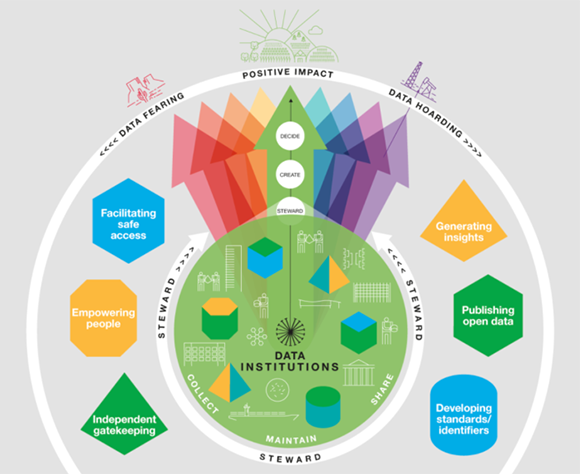
Over the next nine months we’re exploring the concept of ‘responsible data stewardship’. We want to better understand the different dimensions of responsibility to help the Open Data Institute (ODI) and others critically assess data stewardship. Ultimately this research will feed into the development of a tool to help more organisations follow best practice.
At the ODI, we’ve been exploring data institutions – organisations whose purpose involves stewarding data on behalf of others, often towards public, educational or charitable aims – over the last couple of years.
We’ve created the data institutions register to document the variety of data institutions we’ve come across in our work. And through our peer-learning network we’ve convened a cohort of seven organisations that steward open data. To help others understand how data institutions work, we’ve shown how some facilitate safe access to very sensitive data and how others are empowering individuals to explore and share personal data. We’ve also worked closely with INSIGHT, an emerging data institution, to design and run a participatory data governance process.
Responsible Data Stewardship Framework
With support from the Patrick J. McGovern Foundation, we’ve started a new project to develop a Responsible Data Stewardship Framework. At its core, we want the framework to show what stewarding data responsibly entails, and provide a critical lens to help people analyse and compare data stewardship practices. Over time, we’d like to help shift the conversation around – and the practices of – data stewardship from the anecdotal to the empirical.
But what does ‘responsible’ mean in this context and what are the different dimensions that make up responsible data practice? What does responsible data stewardship actually look like in practice, and are there common things that these organisations think about and do? At the moment, our views on this are based on our experiences with specific cases, while much of the wider discourse on data stewardship can feel disconnected from the real world.
We expect the framework to consist of dimensions such as equity, ethics, engagement, openness, transparency and sustainability. We’re aware that this isn’t the first attempt to define responsible data practices and so this project will build on the work of others, such as ResponsibleData.io, the CARE Principles for Indigenous Data Governance and the Global Data Justice project’s work on sustainable and just data governance. It will also build on previous ODI work, including the Trustworthy Data Stewardship Guidebook, and the Data Ethics Maturity Model.
To develop the framework, we will be:
- reviewing literature on the topic of responsible data practices including both ODI and external literature. This will be complemented by investigating practical examples of responsible data stewardship through the practice of data institutions from a variety of geographies and sectors.
- bringing together a diverse group of stakeholders to contribute towards the framework, across different expertises, geographies and roles. We plan to do this in two ways: first through a collaborative crowdsourcing campaign to bring together new resources and perspectives; and second running a collaborative workshop later in the autumn to bring these perspectives together.
- working with prospective users to learn about what a tangible output of this work should look like. This is important not only for this phase of the project, but also looking forward to developing a higher fidelity tool that enables data institutions and others to critically assess and improve the stewardship of data.
Ultimately we want this articulation of responsibility to be useful to as many people as possible, including organisations building new data institutions, those researching and analysing them and those creating an enabling environment for organisations stewarding data.
Data stewardship
The concept of data stewardship is central to this work. We recognise stewarding data as the foundational activity in the lifecycle of data – collecting, maintaining and sharing it. Organisations that steward data make important decisions about who has access to it, for what purposes and to whose benefit.

How data is stewarded ultimately affects what types of products, services and insights it can be used to create, what decisions it can inform and which activities it can support. Data must be stewarded responsibly to ensure that we’re able to mitigate against future ‘data hoarding’ and ‘data fearing’ scenarios, and instead plot a course towards data being used to drive positive societal, environmental and economic impact.
Other researchers, practitioners and organisations have also been thinking hard about the ideals of data stewardship. For the Ada Lovelace Institute data should be stewarded in a ‘participatory and rights-preserving way’, while the Mozilla Foundation uses the concept to describe the act of empowering agents in relation to their own data.
Get in touch
This project is collaborative in nature, and we welcome all forms of input. If you have ideas or examples of responsible data practices please do get in touch.
And if you’d like to take part in our workshop this autumn, send us an email and keep an eye out for more details coming over the summer.